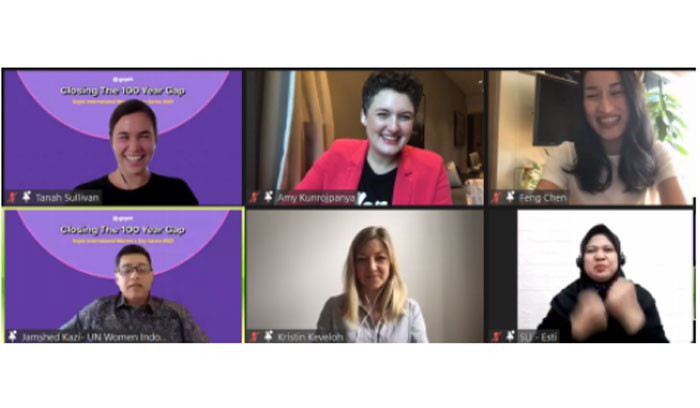
A virtual discussion initiated by Gojek last March, “Closing the 100-Year Gap”, discussed the collective effort in achieving gender equality.)
In honor of Kartini Day, Gojek as Southeast Asia’s leading on-demand platform, announced its participation in the United Nations-initiated No Manel Pledge, which aims to end all-male panels in organizations.
Gojek is the first Indonesian company and first signatory of the Women Empowerment Principles (WEP) to join the initiative, emphasizing Gojek’s commitment to increasing gender equality and inclusivity.
As part of this commitment, Gojek will open opportunities for female speakers to participate in every company-initiated discussion, along with pushing for public discussion organizers to emphasize gender diversity.
Gojek Group Head of Sustainability Tanah Sullivan said in a statement that the company believed in the power of diversity.
“We always make sure that there is always a safe and inclusive space for everyone to be themselves, whoever they are; respected, involved, and supported. As part of our commitment to diversity, we promise to put an end to all-male panels in every Gojek event, as well as including this pledge in every speaking opportunity at Gojek, both in Indonesia and in international spaces,” she said.
The company will also advocate for diverse representation in discussion in other companies and organizations, Tanah added.
The “No Manel Pledge” was initiated by UN Resident Coordinator for Indonesia Valerie Julliand earlier this year. As well as the private sector, a number of government institutions and have pledged their commitment, including the UN, more than 40 ambassadors, the national development planning minister, the head of the National Counterterrorism Agency (BNPT), as well as several senior officials from the Foreign Ministry.
Julliand said that manels or all-male panels did not represent the world's diversity.
“With diversity, our perspectives become much more diverse, which can enrich our wisdoms and make us even more innovative. Moreover, this phenomenon is the manifestation of sexism and exclusion, which can strengthen gender stereotypes of men as a higher authority and being more capable, even when there are women who have the same or higher position and skills whose contributions are often ignored,” she said.
Meanwhile, UN Women Indonesia Representative and Liaison to ASEAN Jamshed M. Kazi said manels were considered regular occurrences, so in turn not many questioned their legitimacy.
“Consequently, ignoring women’s involvement has become a norm, so we are losing valuable perspectives, skills, and voices on public policy. We appreciate Gojek’s decision to join national and international partners in their commitment to this year’s ‘No Manel Pledge’.”
Gender equality has significantly contributed to economic growth and sustainable development. According to a 2018 McKinsey & Company report, the increase of gender equality for women can contribute $4.5 trillion to the Asia-Pacific economy in 2025.
As a tech company with high commitments to create a positive social impact, Gojek actively promotes gender equality and diversity inside the company. Recently, it introduced Women@Gojek, an employee resource group led by Gojek employees. Women@Gojek enables female employees to grow their potential through training, collaboration and discussion, while at the same time nurturing awareness of workplace inclusivity.
Alongside internal efforts, Gojek is also a pioneer in creating a culture of safety for women in Indonesian public spaces through the #AmanBersamaGojek (#SafeWithGojek) initiative. The initiative received national and international recognition at the 2020 UN Women Asia-Pacific Women's Empowerment Principles Awards. Previously, Gojek and UN Women have partnered to increase female entrepreneurship skills in Indonesia through digital business training program Gojek Wirausaha, which is available at UN Women’s training platform WeLearn.